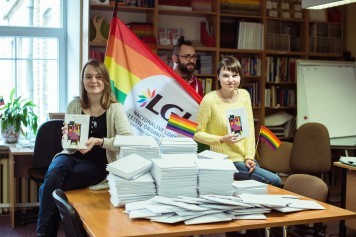A Director of Pilaitė high school in Vilnius Zotikas Popovas was “horrified” to receive a publication about homophobic bullying in Lithuanian schools, sent as a gift to schools and educational institutions throughout the country by the national LGBT* rights organization LGL on the 3rd of April, 2015. The publication “Homophobic Bullying in Lithuanian Schools: Survey Results and Recommendations” sheds light on homophobic and biphobic bullying and provides information needed to end violence in learning environments. The Director of the high school, however, has a different perspective on the purpose of LGL’s publication. According to Mr. Popovas, a publication that aims to provide teachers knowledge upon how to help fight against violence in the learning environment is propaganda related to homosexuality.
“When we started talking about addiction to drugs, the number of drug addicts increased sharply, because the majority of students discovered what it was and they all tried it. Homosexual relationships may be also tried, to see how opposite to normal and acceptable in a Christian country relationships feel like,” declared Mr. Popovas to Lithuanian TV channel “TV3”.
The national LGBT* rights organization LGL has sent the publication “Homophobic Bullying in Lithuanian Schools: Survey Results and Recommendations” to 250 Lithuanian schools, all of the pedagogical psychological service providers working in Lithuania, higher learning institutions training educators and social workers, the Ministry of Education and Science of the Republic of Lithuania, the Committee on Education, Science and Culture of the Parliament of the Republic of Lithuania, the Lithuanian School Students’ Union and the Lithuanian Pupil’s Parliament.
“This is a gift from the European Commission to Lithuanian teachers,” stressed the Executive Director of LGL Vladimir Simonko to “TV3 News”. According to Mr. Simonko, this publication aims to contribute to bullying prevention, and provide the information needed to end violence in learning environments.
LGL’s publication, “Homophobic Bullying in Lithuanian Schools: Survey Results and Recommendations,” which was released in March, 2015, constitutes the first step in trying to solve the problem of homophobic and biphobic bullying in Lithuania.
According to a survey conducted by LGL in October and November, 2014, bullying based on sexual orientation is faced by eight out of ten surveyed students. More than one-third of students who took part in the study stated that they feel unsafe at school, and more than half of them revealed their sexual orientation only to the people closest to them. More than one hundred and fifty LGBT* young people, aged 13-20, spoke about their experience of homophobic and biphobic bullying in Lithuanian schools.
Mr. Popovas stressed that he will make sure that LGL‘s publication would not be placed in Pilaitė high school‘s library. The Director of the school claimed he „had never received such a gift in his forty years professional experience“. “I was surprised by this. Why this book ended up exactly at school?” he asked rhetorically.
In addition, the Director claimed that LGL’s survey provides “unrealistic data”. Mr. Popovas found it difficult to believe that eight out of ten homosexual or bisexual students would experience bullying in Lithuanian schools. In his opinion, only 30% of students in Lithuania admit that they have been bullied in school.
Meanwhile, Mr. Simonko regrets that a part of teachers in Lithuania still use homophobic language. “They say hide homosexuality and you will have no problems at school. If this is our response to homophobic bullying, we risk to encourage violence in educational environments even more. Such attitudes prevent a large portion of homosexual and bisexual students from feeling safe in school,” emphasized the leader of LGL.
The national LGBT* rights organization LGL emphasizes that in order to effectively overcome the issue of homophobic bullying in the field of education, it is necessary to recognize both the existence and the scale of this issue. The association LGL reminds that the needs of homosexual and bisexual youth are the same as those of their peers: they want to feel safe, to not be discriminated against for being who they are, and to have the right to achieve their educational goals. If even one teacher changes their response to homophobic bullying, the entire atmosphere of a school can improve.




